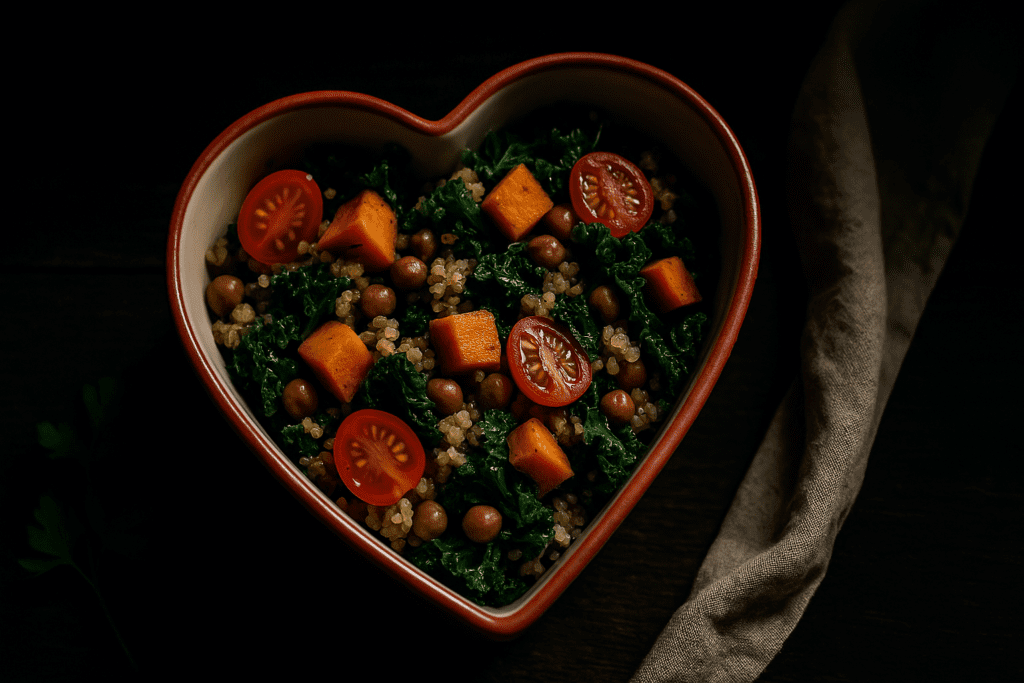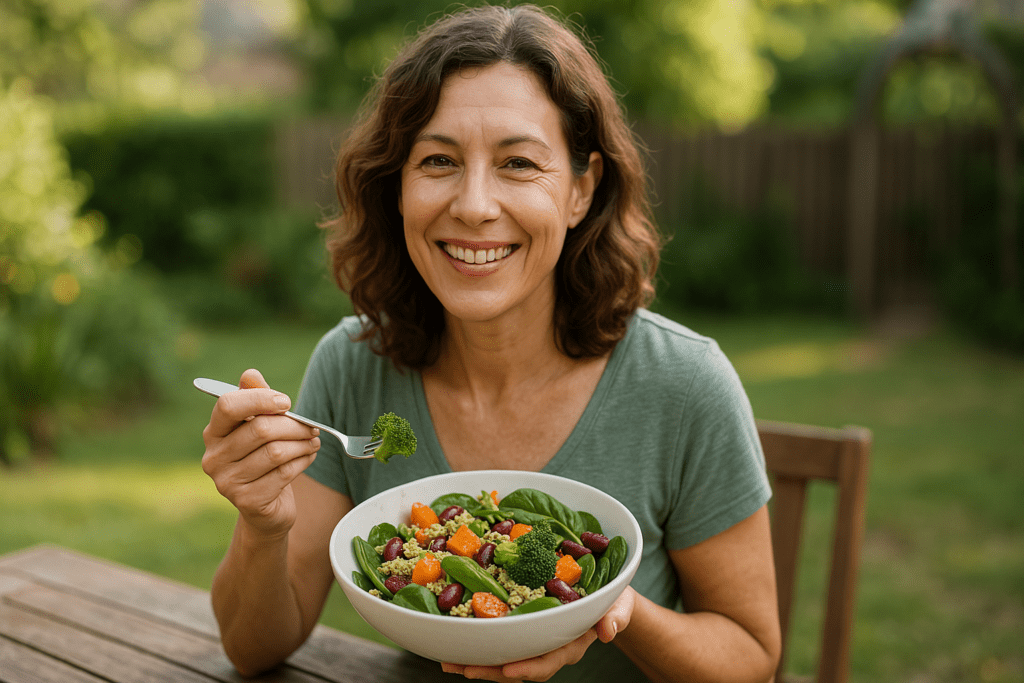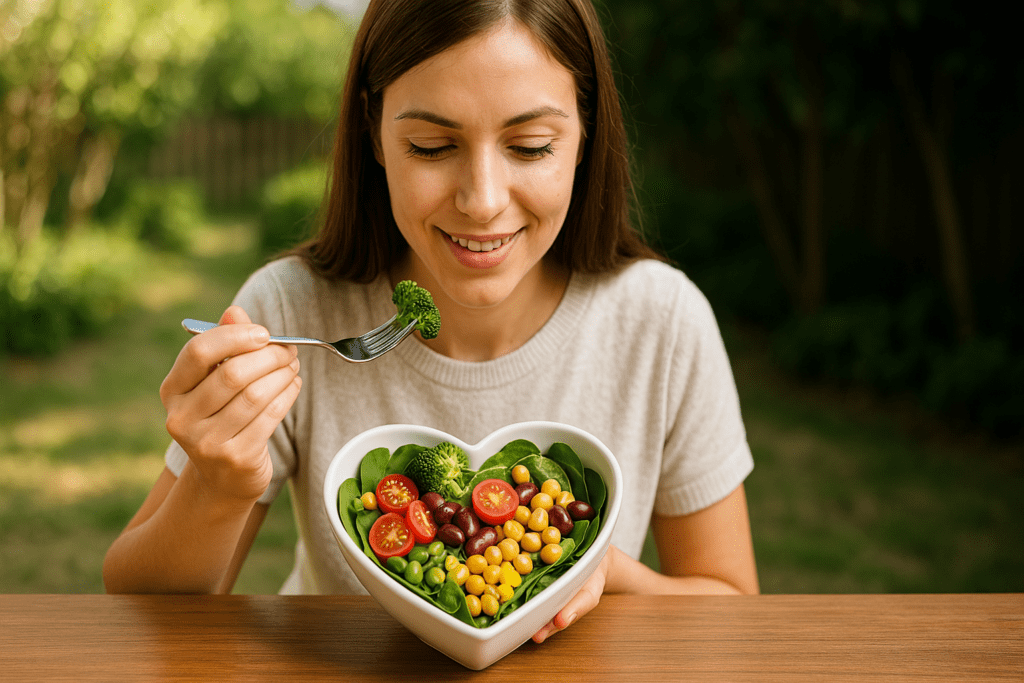In an era where chronic conditions like heart disease continue to top the list of preventable causes of death, there is a growing shift toward lifestyle modifications that prioritize holistic health. One of the most influential and evidence-backed lifestyle changes is the transition to a whole-food, plant-based diet. A focus on heart-healthy vegetarian recipes has become more than a culinary trend; it is a scientifically supported approach to improving cardiovascular outcomes. These recipes—rich in fiber, antioxidants, phytonutrients, and healthy fats—serve not only as delicious meal options but also as therapeutic tools that nourish the heart and prevent disease. As dietary science advances, so does our understanding of how healthy veg dishes can influence cholesterol levels, inflammation, and endothelial function, thereby promoting long-term cardiovascular resilience.
You may also like: Healthy Plant-Based Dinners Made Easy: Best Whole Food Plant-Based Recipes for Beginners and Beyond
The science of plant-based eating is grounded in decades of rigorous research. Studies consistently demonstrate that individuals who follow vegetarian or vegan diets tend to have lower blood pressure, reduced LDL cholesterol levels, and a decreased risk of coronary artery disease. The link between plant-based diets and heart health lies not just in the absence of animal fats but also in the abundance of nutrient-dense ingredients that actively support vascular function. Leafy greens like spinach and kale, legumes such as lentils and chickpeas, whole grains like quinoa and brown rice, and nuts and seeds—all hallmarks of heart healthy vegan recipes—play a vital role in supporting arterial elasticity and reducing oxidative stress. These ingredients, when prepared with culinary mindfulness, form the basis of heart healthy meatless meals that are as therapeutic as they are flavorful.
Understanding the Nutritional Pillars of Cardiovascular Health
Cardiovascular health is influenced by a complex interplay of genetics, lifestyle, and environmental factors. Among these, diet emerges as a modifiable and potent determinant. At the core of heart-healthy vegetarian recipes is the deliberate inclusion of foods that mitigate common cardiovascular risk factors. Soluble fiber, for instance, found abundantly in oats, legumes, and certain fruits, binds to cholesterol in the digestive tract and helps eliminate it from the body. This mechanism directly contributes to lowering total and LDL cholesterol, thereby decreasing the risk of atherosclerosis.
Polyphenols and flavonoids, two powerful classes of antioxidants found in colorful vegetables, fruits, teas, and spices, reduce inflammation and oxidative damage to blood vessels. In particular, flavonoids from berries and dark chocolate have been associated with improved endothelial function, which is a key indicator of vascular health. Potassium-rich foods like sweet potatoes, bananas, and beans help regulate blood pressure by counteracting the effects of sodium. Moreover, heart healthy vegan recipes often incorporate omega-3-rich foods such as flaxseeds, chia seeds, and walnuts, which support anti-inflammatory pathways and reduce the likelihood of arrhythmias and thrombosis. These ingredients are more than culinary choices—they are nutritional interventions grounded in science.
Why Meatless Meals Matter for Your Heart
Adopting a diet centered on heart healthy meatless meals offers significant advantages for cardiovascular wellness. The reduction or elimination of saturated fats, commonly found in red meat and full-fat dairy, helps lower blood cholesterol levels and decreases the burden on the cardiovascular system. In contrast, plant-based fats, particularly those from avocados, nuts, and seeds, provide essential fatty acids without contributing to arterial plaque formation.
Beyond fat content, meatless meals are typically higher in dietary fiber, which not only supports digestive health but also plays a key role in regulating blood sugar and cholesterol. Fiber-rich meals contribute to a feeling of satiety, which can aid in weight management—an important factor in heart disease prevention. Many heart healthy vegetarian recipes are designed to optimize nutrient absorption and promote glycemic control, thereby reducing the risks associated with insulin resistance and metabolic syndrome.
Epidemiological studies support these benefits. Populations with high adherence to plant-based diets, such as those in the Blue Zones, consistently demonstrate longer lifespans and lower rates of cardiovascular events. This real-world data, combined with clinical research, underscores the relevance of healthy veg dishes in everyday meal planning for those looking to improve or maintain heart health.

Flavor Without Compromise: Redefining Healthy Eating
One of the most enduring myths surrounding plant-based diets is that they are bland or unsatisfying. However, the landscape of healthy veg dishes has evolved dramatically, offering bold flavors and creative textures that rival traditional meat-based cuisine. Advances in culinary innovation and global fusion have introduced an array of spices, marinades, and cooking techniques that elevate plant-based ingredients to new heights.
Consider, for example, a lentil and walnut “meatball” served over whole-grain spaghetti with a tomato basil reduction. Not only does this dish provide plant-based protein and fiber, but it also harnesses the umami depth typically associated with meat. Another staple of heart healthy vegan recipes is the chickpea curry simmered in coconut milk with turmeric and ginger—ingredients known for their anti-inflammatory properties. These meals exemplify how plant-based cooking can satisfy the palate while delivering measurable cardiovascular benefits.
Embracing global cuisine expands the horizon further. Mediterranean tabbouleh made with bulgur wheat, parsley, and lemon offers a refreshing, antioxidant-rich option. Meanwhile, Asian-inspired stir-fries using tofu, bok choy, and sesame seeds combine taste with cardiovascular support. By embracing diverse culinary traditions, individuals can access a world of heart healthy meatless meals that align with both health goals and cultural preferences.
The Role of Whole Foods in Disease Prevention
Central to the philosophy of whole-food plant-based nutrition is the avoidance of overly processed foods. While plant-based diets are inherently beneficial, their protective effects can be compromised when centered around refined grains, added sugars, and sodium-laden meat substitutes. Instead, heart healthy vegetarian recipes prioritize whole ingredients in their most natural forms, thereby preserving the synergistic benefits of their nutrients.
Whole foods provide fiber, complex carbohydrates, vitamins, and minerals in a package that the body is well-adapted to process. These foods work in concert to support immune function, stabilize blood sugar, and maintain healthy blood pressure—all of which are critical to cardiovascular health. By choosing steel-cut oats over instant oatmeal or opting for fresh fruit instead of fruit juice, individuals retain the fiber and phytonutrient content that is often lost in processing.
Importantly, the preparation methods matter as well. Steaming, roasting, and sautéing with minimal oil preserve the integrity of the food while enhancing flavor. Recipes that avoid deep frying or heavy sauces reduce unnecessary calorie and fat intake. In this way, the focus on whole foods within heart healthy meatless meals not only supports physical well-being but also fosters a mindful approach to eating.
Practical Strategies for Transitioning to a Heart-Healthy Plant-Based Lifestyle
Adopting a plant-based diet rich in heart healthy vegetarian recipes does not require an overnight overhaul. Rather, it can be approached as a gradual and sustainable transition. One effective strategy is the incorporation of “Meatless Mondays,” which encourages individuals to explore new recipes one day a week. This manageable shift introduces variety without the pressure of complete dietary change.
Meal prepping is another powerful tool. By setting aside time each week to prepare components such as roasted vegetables, cooked legumes, and whole grains, individuals can streamline the cooking process and make heart healthy meatless meals more accessible during busy days. Involving family members or housemates in meal planning can also foster a supportive environment, making dietary changes more enjoyable and communal.
Education is key to empowerment. Understanding how to read food labels, assess ingredient lists, and identify sources of hidden sodium or sugar can significantly enhance the nutritional quality of chosen meals. There are numerous online platforms, cookbooks, and community classes that offer guidance on how to craft balanced and flavorful plant-based dishes. Engaging with these resources can demystify the process and build culinary confidence.
Navigating Nutritional Adequacy in Plant-Based Diets
While heart healthy vegan recipes offer an abundance of nutrients, thoughtful planning is necessary to ensure nutritional adequacy. Certain nutrients, such as vitamin B12, iron, and omega-3 fatty acids, require special attention in a fully plant-based diet. Vitamin B12, which is essential for nerve function and red blood cell formation, is not naturally present in plant foods and should be obtained through fortified foods or supplements.
Iron from plant sources, known as non-heme iron, is less readily absorbed than that from animal sources. However, its absorption can be enhanced by pairing iron-rich foods like lentils and spinach with vitamin C sources such as citrus fruits or bell peppers. Similarly, omega-3 fatty acids can be sourced from flaxseeds, chia seeds, and walnuts, although some individuals may benefit from algae-based DHA supplements for comprehensive support.
Calcium and vitamin D are also important for vascular and bone health. Fortified plant milks and leafy greens like kale and bok choy can help meet calcium needs, while safe sun exposure or vitamin D supplements ensure adequate levels. By understanding these nutritional nuances, individuals can confidently build a plant-based diet that is both heart-protective and complete.
The Psychological and Social Dimensions of Plant-Based Eating
Beyond its physiological benefits, adopting a diet based on healthy veg dishes can have profound psychological and social impacts. Many individuals report increased energy levels, improved mood, and enhanced mental clarity after transitioning to a plant-based lifestyle. These changes may be attributed to more stable blood sugar levels, reduced inflammation, and a greater intake of micronutrients essential for brain health.
Socially, plant-based eating can be a catalyst for community and connection. Potlucks, cooking classes, and online forums create spaces for sharing recipes, experiences, and support. These interactions not only make the journey more enjoyable but also reinforce positive habits. In many cases, individuals become advocates for heart healthy vegetarian recipes within their social circles, spreading awareness and inspiring others to explore healthier eating patterns.
There is also a growing sense of purpose and alignment with broader values. For some, plant-based eating resonates with environmental sustainability or ethical considerations regarding animal welfare. When dietary choices reflect personal values, they often become more meaningful and sustainable. This deeper motivation can enhance adherence and make heart healthy vegan recipes a lasting part of one’s life.
Delicious Recipes That Highlight Cardiovascular Support
To bring these concepts to life, consider incorporating a few versatile, evidence-based recipes into your weekly rotation. A quinoa and black bean salad with avocado and lime dressing offers a high-protein, high-fiber option that is rich in potassium and healthy fats. Roasted Brussels sprouts with balsamic glaze and toasted walnuts deliver powerful antioxidants and a satisfying crunch. A warming lentil stew with carrots, celery, and tomatoes not only comforts but also provides ample soluble fiber and iron.
Breakfast can also be a heart-healthy affair. Overnight oats soaked in almond milk with chia seeds, blueberries, and a drizzle of almond butter provide a nutrient-dense, energizing start to the day. For dessert, a dark chocolate and raspberry chia pudding satisfies the sweet tooth while contributing flavonoids and omega-3s. Each of these dishes exemplifies how heart healthy vegetarian recipes can be deeply nourishing, delightfully flavorful, and grounded in scientific integrity.

Frequently Asked Questions: Heart-Healthy Vegetarian Recipes and Plant-Based Cardiovascular Wellness
What are some overlooked ingredients that can enhance heart healthy vegetarian recipes?
While common staples like lentils and leafy greens often headline healthy veg dishes, lesser-known ingredients such as amaranth, black garlic, and seaweed provide remarkable cardiovascular benefits. Amaranth is a gluten-free grain that contains high-quality protein and is rich in magnesium—a mineral crucial for maintaining a healthy heartbeat. Black garlic, which is aged to enhance its antioxidant content, has shown promise in reducing arterial stiffness, a key marker of heart disease risk. Seaweed offers iodine and alginates, compounds that may assist in blood pressure regulation and cholesterol management. Incorporating these unique elements can elevate the nutritional profile of heart healthy vegetarian recipes while adding unexpected depth and flavor to your meals.
How can I make heart healthy meatless meals more appealing to skeptical family members?
Converting reluctant eaters into fans of heart healthy meatless meals often comes down to strategic presentation and flavor layering. Start by mimicking familiar dishes—use lentils in a shepherd’s pie, jackfruit in barbecue sliders, or mushrooms in stroganoff. Seasoning plays a critical role; umami-rich ingredients like tamari, nutritional yeast, and smoked paprika can replicate the savory essence of meat. Additionally, focus on visual appeal—colorful roasted vegetables, vibrant herbs, and artistic plating can make healthy veg dishes as eye-catching as they are nutritious. When meals feel indulgent rather than restrictive, even the most hesitant eaters may embrace the switch.
Are there emerging trends in heart healthy vegan recipes that combine convenience with nutrition?
Yes, a growing number of innovations are making heart healthy vegan recipes more accessible to time-strapped individuals without compromising on health. One trend is the rise of ready-to-eat refrigerated grain bowls that include ancient grains, legumes, and fermented vegetables. Another is the development of air-fryer friendly dishes that minimize oil while preserving crisp textures. Companies are also launching plant-based meal kits tailored for cardiovascular health, often designed in collaboration with dietitians. These modern conveniences allow individuals to prepare nutritious, heart healthy vegetarian recipes quickly, making it easier to maintain dietary goals even during hectic weeks.
How do healthy veg dishes support athletic performance and recovery?
Contrary to outdated assumptions, plant-based eating can effectively fuel both endurance and strength-focused athletes. Heart healthy vegetarian recipes provide ample complex carbohydrates from sources like sweet potatoes and quinoa, which support sustained energy release. They also offer plant-based protein from beans, tofu, and tempeh to aid muscle repair. Anti-inflammatory compounds in berries, leafy greens, and turmeric help reduce muscle soreness and accelerate recovery post-workout. Additionally, nitrates from beets and arugula can enhance circulation and oxygen delivery, making heart healthy vegan recipes not only suitable but optimal for active lifestyles.
Can heart healthy vegan recipes contribute to stress reduction and better mental health?
Yes, there’s a growing body of evidence suggesting that diets rich in plant-based whole foods can support psychological well-being. Heart healthy meatless meals are typically high in magnesium and B vitamins, nutrients known to modulate stress responses and support brain function. Foods like dark leafy greens, avocados, and seeds contribute to stable blood sugar levels, which can help prevent mood swings. The gut-brain axis also plays a role—fiber-rich healthy veg dishes promote a diverse microbiome, which in turn supports mental clarity and emotional balance. Mindful cooking and eating practices further enhance these benefits by creating a calm, intentional space around food preparation and consumption.
What are some cultural cuisines that naturally align with heart healthy vegetarian recipes?
Many traditional global cuisines have long emphasized ingredients and preparation methods that are inherently supportive of heart health. The Indian diet, with its lentil-based dals, turmeric, and spice-rich vegetable curries, offers flavorful templates for heart healthy vegan recipes. Middle Eastern dishes like mujadara (lentils and rice) or fattoush (vegetable salad with sumac) also align well with cardiovascular goals. Ethiopian cuisine features dishes like misir wot, a spicy red lentil stew, often served with injera—a fermented flatbread rich in probiotics. These globally inspired healthy veg dishes showcase how cultural traditions can intersect beautifully with modern nutritional science.
How do heart healthy meatless meals impact long-term disease prevention beyond cardiovascular health?
The benefits of heart healthy meatless meals often extend well beyond the heart. Regular consumption of fiber-rich, antioxidant-packed foods can reduce the risk of type 2 diabetes by improving insulin sensitivity and regulating blood sugar levels. Many ingredients in heart healthy vegetarian recipes, such as cruciferous vegetables and whole grains, have been associated with lower cancer risk due to their anti-inflammatory and detoxifying properties. These meals also contribute to kidney function by minimizing the intake of animal-based protein and phosphorus. By supporting multiple organ systems, heart healthy vegan recipes foster a foundation for lifelong health and disease prevention.
What role does sustainability play in choosing healthy veg dishes for heart health?
Environmental sustainability is a compelling and often overlooked dimension of dietary choices. Plant-based diets require fewer natural resources—such as water, land, and fossil fuels—than those rich in animal products. Choosing heart healthy vegetarian recipes not only benefits your cardiovascular system but also supports ecological balance. Many people find that this alignment between personal health and planetary well-being deepens their commitment to heart healthy meatless meals. Furthermore, sourcing local and seasonal produce reduces your carbon footprint while enhancing the freshness and nutritional density of your meals.
How can people on a budget prepare heart healthy vegan recipes without sacrificing quality?
Creating heart healthy vegan recipes on a budget is entirely achievable with thoughtful planning and smart ingredient choices. Staples like dried beans, whole grains, frozen vegetables, and seasonal produce offer high nutritional value at a low cost. Batch cooking and freezing portions reduce waste and make mealtime more efficient. Community-supported agriculture (CSA) boxes and farmers’ markets often provide affordable access to fresh, local foods. By focusing on unprocessed ingredients and avoiding expensive meat substitutes, you can craft deeply nourishing, healthy veg dishes that are both economical and delicious.
What are some long-term lifestyle shifts that help sustain a diet based on heart healthy vegetarian recipes?
Sustaining a plant-forward lifestyle goes beyond simply following recipes; it involves reshaping daily habits and social environments. Keeping a rotating menu of favorite heart healthy meatless meals on hand prevents dietary fatigue. Building relationships with local produce vendors or joining plant-based social groups can offer encouragement and inspiration. Continuing education through cooking classes, podcasts, or nutrition workshops reinforces your knowledge and commitment. Meal planning and journaling successes and challenges also help track progress and maintain motivation. Ultimately, integrating heart healthy vegan recipes into your life is a dynamic process that thrives on consistency, curiosity, and community.

Reflecting on the Power of Plant-Based Eating for Heart Health
The evidence is clear and compelling: adopting a diet centered around heart healthy vegetarian recipes can yield profound benefits for cardiovascular health. Through the inclusion of nutrient-dense whole foods, the reduction of harmful fats, and the enrichment of the diet with fiber and antioxidants, individuals can actively support their heart’s longevity and function. These meals are not just preventive; they are restorative, offering a path toward healing and vitality.
Heart healthy vegan recipes demonstrate that it is entirely possible to enjoy deeply satisfying meals while also aligning with the best practices of nutritional science. They invite a reconsideration of what constitutes comfort food and challenge the outdated notion that health must come at the expense of taste. Through mindful preparation, creative seasoning, and thoughtful ingredient choices, healthy veg dishes can become staples of both joy and wellness.
As the conversation around chronic disease prevention continues to evolve, dietary interventions like heart healthy meatless meals will remain at the forefront. They represent an empowering, accessible, and enjoyable strategy for reclaiming health. In embracing this lifestyle, we do more than change what’s on our plates—we transform our relationship with food, health, and ultimately, ourselves.
Further Reading:
Heart disease is the biggest killer in the US. Here’s how a vegan diet may help reduce your risk.
Vegetarian, Vegan and Meatless Meals
plant-based diet for heart health, vegetarian heart health tips, vegan cholesterol lowering foods, plant-based cardiovascular support, low sodium plant meals, vegan high fiber meals, antioxidant rich vegan foods, whole food plant-based recipes, heart smart cooking, vegetarian omega-3 sources, meatless diet for heart disease, vegan potassium-rich foods, anti-inflammatory plant-based meals, plant-based nutrition science, healthy vegan protein sources, Mediterranean vegetarian meals, fiber rich vegetarian dishes, DASH diet vegetarian options, vegan foods for blood pressure, nutrient dense plant-based meals
The information contained in this article is provided for general informational purposes only and is not intended to serve as medical, legal, or professional advice. While NewsHealthWatch strives to present accurate, up-to-date, and reliable content, no warranty or guarantee, expressed or implied, is made regarding the completeness, accuracy, or adequacy of the information provided. Readers are strongly advised to seek the guidance of a qualified healthcare provider or other relevant professionals before acting on any information contained in this article. NewsHealthWatch, its authors, editors, and contributors expressly disclaim any liability for any damages, losses, or consequences arising directly or indirectly from the use, interpretation, or reliance on any information presented herein. The views and opinions expressed in this article are those of the author(s) and do not necessarily reflect the official policies or positions of NewsHealthWatch.

